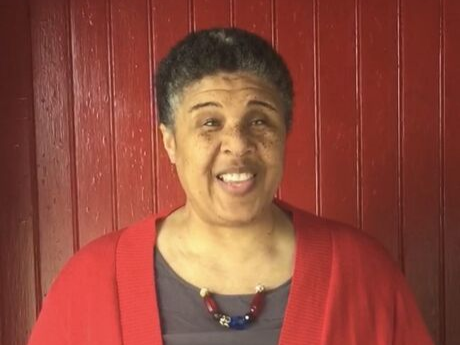New American Poets
New American Poets: Constance Merritt

Vandals
The house we could not enter, not even through
The back door or on the arm of our lover, night.
The landlord was no fool. He knew what might
Get started if he let us in. Knew
How sorely we decrease property value.
Look around you. Can you say he wasn't right?
See these handsome bruises. Drink in the blue
And laugh. Then show me the wounds I gave to you
Without a touch. Fuck love when we can fight
Like this. I tell you, baby, we be fierce!
[The conjugation's from your Tudor past.]
In juke joints, churches, and bad streets in town,
When a speaker moves in close, gets near brass tacks,
We say: Come on now, all right, break it down.
"Vandals" by Constance Merritt. Copyright © 1999 by Constance Merritt. Reprinted with the permission of the author.
"Poetry," writes Stevens "is an effort of a dissatisfied man to find satisfaction through words," and in a related apothegm: "Poetry is a purging of the world's poverty and change and evil and death. It is a present perfecting, a satisfaction in the irremediable poverty of life." What Stevens states baldly, Randall Jarrell, whom Robert Lowell described as the most heartbreaking poet of his generation, brilliantly enacts. In one of his dramatic monologues a woman comes to the realization of the terror at the heart of existence while considering her aging face in a mirror. In another, a man surveys life's prospects from the vantage point of middle age:
Here where North, the night, the berg of death
Crowd me out of the ignorant darkness,
I see at last that all the knowledge
I wrung from the darkness—that the darkness flung me—
Is worthless as ignorance: nothing comes from nothing,
The darkness from the darkness. Pain comes
from the darkness
And we call it wisdom. It is pain.
—from "90 North"
This is where it starts for me, not only poetry but any hope of a reasonable and humane adult existence and of our continuance, as a species, on this planet: in the acknowledgment of the hard facts that condition any life and their acute magnification through the singular gift of human consciousness. To acknowledge pain as pain, let alone the poverty of life, let alone that this poverty—that anything—is irremediable is a powerful antidote to our much-cherished doctrines of the imminent perfectibility of our species and our world, doctrines we continue to cling to despite their destructiveness having been proven again and again. While politics of whatever stripe pursues remedies for real and perceived ills through shifts in the balance of power, poetry eschews power, cultivates vulnerability instead, traces social problems back to psychic roots, does not so much seek to heal divisions inherent in the human heart as to effect provisional re-integrations, peaceable coexistence, and peaceful conflicts. "The mind is the most terrible force in the world," Stevens writes, "principally in this that it is the only force that can defend us against itself. The modern world is based on this pensée." And then one day, if we are lucky, acknowledgment takes a subtle turn, becomes acceptance, becomes celebration: a present perfecting, a satisfaction in the irremediable poverty of life. In one reading, poetry is a little island adrift in the ocean of life's irremediable poverty, but in another, life, its irremediable poverty notwithstanding, becomes the source of one's satisfaction, as the world is subtly altered by our imagination and our words. To teach men how to love their lives— this life, this world, the only one there is—and passionately, this, this seems to me the most radical end of poetry.


